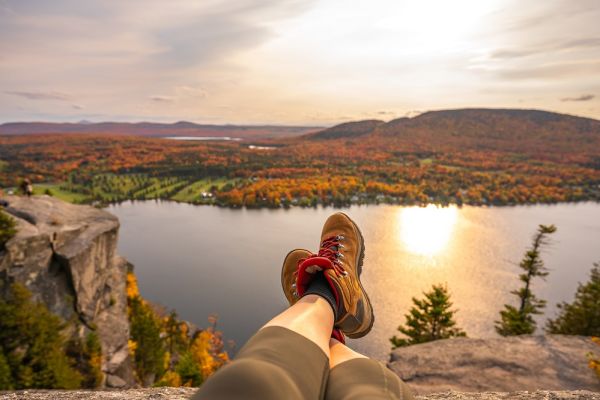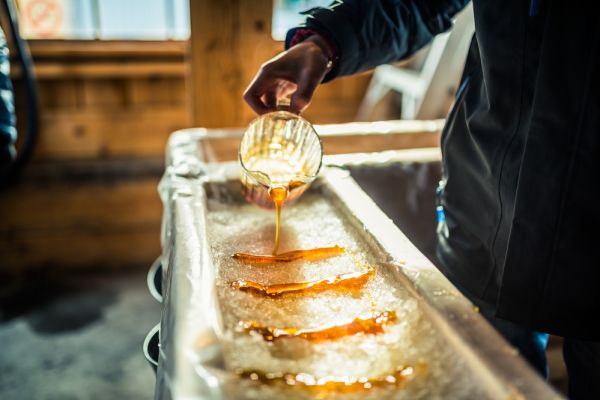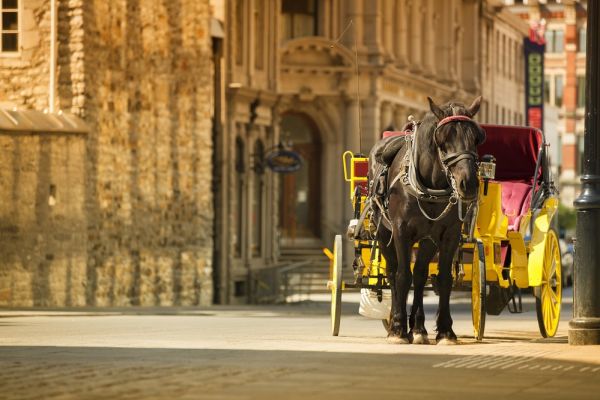QuebecTravel Guide
Bonjour! Welcome to Canada’s Petit Paris. Like her big sister, Québec City is classy, romantic and drop-dead gorgeous, but her French-Canadian roots are exclusively hers. Set on the St Lawrence River, she welcomes visitors to her port with views of the iconic Château Frontenac – a fairytale grand hotel, complete with turrets and spires. So, what else is this capital city known for, we hear you ask? Well, she has so many charms, we can’t list them all. That’s why we’ve compiled our fabulous Québec Travel Guide to give you the inside scoop. But since you asked, let’s pique your interest: she’s a top destination, a foodie and cultural hotspot, a skiing paradise and a historical treasure. Inspired? We thought so.
Quebec quick facts
Language
National language
English
Beverages
Bottle of Coke/Pepsi (330ml)
GBP £1.42
Local time
Tuesday
9:38pm
Currency
Canadian dollar
GBP £1.00 = CAD $1.75
Eating out
Restaurant meal (casual dining)
GBP £12.55
Electricity
Plug type: A
2 or 3 pins • 120V
Explore Quebec
Where to stay in Quebec?
The best place to stay in Québec City, hands down, is in Old Québec. Not only are the best four- and five-star hotels there but you’re also within walking distance of attractions, shops, restaurants, the port and nightlife. Of course, the hotel everyone wants to stay at is the magical, five-star Château Frontenac. Built between 1892 and 1893, it has the honour of being world’s most photographed hotel (no surprises there) and it’s a National Historic Site. Wine your time away at the fabulous 1608 Wine & Cheese Bar or luxuriate at the spa. Prefer suburbia? Then the Plaza Quebec should do just fine. While a modern four-star hotel, it’s been decked out in a cathedral façade. Go figure. Some features are a hot tub, spa, indoor pool, children’s playground and it’s close to malls and the Parc Aquarium du Quebec. Want the best of both worlds? The Hôtel Palace Royal is at the entrance of the city walls – near to the highways and Old Québec. Its claim to fame is an indoor garden oasis.
Believe us when we say, this is just the start. Book your accommodation today!
Things to do in Quebec
As you’d expect from Old Québec, historical sites and museums can be found en masse (see what we did there?). There’s also a funicular and sugar shacks to sweeten your visit.
The Quartier Petit Champlain beats at the heart of Old Québec, a quaint Parisian-style shopping zone. Its popular funicular transports you between Old Québec’s Upper Town and Lower Town, giving you a bird’s-eye view of the cobblestone streets, heritage buildings, little cafés and shops, and the meandering St Lawrence River below. Plus, you don’t have to walk up the steep steps – what a win.
The neighbourhood of Montcalm is a vibrant arts and culture hub, packed with art galleries, theatres, the opera, cinemas and bookstores. This is also where art projects sometimes take over the entire street; in 2021-2022 34 oversized lampshades were turned into canvases and every year, the work of new local artist is illuminated in this way. In Rue du Cul-de-Sac in the Lower Town, an instagrammer’s delight awaits. The Umbrella Alley art installation has umbrellas hanging above the cobbled street, lending it a pop of colour. Strolling around the city you’ll see frescoes everywhere but the crème dela crème is in the city square of Place-Royale. The massive, realistic mural Fresque des Québécois is guaranteed to knock your socks off.
In Canada, maple syrup is the nectar of the gods. Sought-after worldwide, the province of Québec is the biggest producer. Made by tapping the sap from maple trees and boiling it into syrup, this takes place at the sugar shacks in spring. More than this, the amber stuff is intertwined with tradition, families and feasting. Pop into to a sugar shack to watch the process unfold, then tuck into some delicious fare, drizzled with maple syrup of course.
Looking for an immersive experience? Then a tour is the way to go.
Quebec food and drink
Well, where do we even start? Québec is a culinary hotspot with something for every palate and every kind of diner.
It’s a no-brainer that fine dining has a seat at the table in Old Québec, where many restaurants are owned by the chefs themselves. Let’s name-drop two of our favourites. The award-winning Le Saint-Amour , tucked into a historic building, is a fittingly romantic space. Famed for its signature dish – seared duck foie gras – the wine list is also among the best in the country. Fine cuisine with a twist is what Légende dishes up, paying homage to Québec’s Aboriginal beginnings and a return to the city’s roots. The menu is seasonal, dishes made exclusively with local ingredients and constantly changed up. Prepare for some culinary surprises, like duck gizzards.
Québec City has a wealth of these markets selling the best that the local terroir produces. This is where you can dip your tastebuds into French-Canadian delicacies like Montréal smoked meat, maple syrup, tourtière (pork meat pie), freshly baked pastries, cheeses, handcrafted chocolates, and so much more.  – a huge building housing more than a hundred vendors..
Québec City naturally has its fill of such establishments. The Petit Champlain and Saint-Roch districts are good ones to sample your way through. Also, it’s mandatory to try the national dish, which originated in this city, and has since gone viral. Poutine, meaning ‘a mess’, might put you off but it’s actually tasty comfort food. Well, maybe closer to fast-food. French fries are decked out with cheese curds and a variety of toppings like meat or mushrooms and then drenched in brown gravy.
Ever hopped on an island to do wine-tasting? Well, d’Orléans (called the Isle of Bacchus circa 1535!) is an oenophile’s paradise in the St Lawrence River, dotted with picturesque vineyards and quaint villages. Swig local varietals, sip some ice wine (a delicious sweet wine made from grapes frozen on the vine in winter) or sample the ciders. Delicious local cheeses discoverable at Fromages de l'isle d'Orléansd'Orléans
Get a real taste for the local cuisine by booking a tour.
Quebec through your eyes
Where to shop in Quebec?
Something old, something new, shopping in the city is nothing if not eclectic and vibey. In Old Québec, head to quaint Rue de Petit Champlain, the happening street for shopping. Surrounded by 18th century French architecture, you’ll be treading the cobblestones and discovering alleyways with boutiques, art galleries, artisanal creations and jewellery. If malls are more your vibe, you’ll want to see what all the fuss is about at Laurier Québec. After Old Québec, it’s the biggest tourist attraction, with 12 million visitors every year. Next door is Place Ste-Foy, a modern fashion hub stocking all the big-name brands, with several exclusive boutiques and stores. The two malls combined stock more than 400 top fashion and lifestyle brands – a shopaholic’s dream. Craft markets are so Québec, with the Lachute Flea Market one of the biggest – a treasure trove of clothing, antiques, horse tack, pottery and bronze items. Another goodie is the Jean-Talon Market in Charlesbourg. A huge warehouse-like space, browsing all the antiques, electronics, second-hand gems and fashion could take a chunk out of your day – but you won’t regret it.
Looking for a safe and simple way to bring your money when you travel? Our Travel Money Card has you covered!
When is the best time to travel to Quebec?
Québec City is beautiful all year round. The climate is humid and warm in summer (June-Aug), with an average temperature of around 25°C (77° F). For outdoor holidays where you want to be cycling or enjoying water activities, summer is the best time to visit Québec. That’s also festival season. July, August and September are peak season while April, May, June are low season. Autumn (Sep-Nov) is best for hiking and visiting national parks and winter is, of course, ski season (Dec – Feb). It’s cold, windy and there’s snow. Lots of it. January is the chilliest month with an average minimum temperature of -17.7°C (0.14°F). Now that we’ve come to the end of our travel guide, we reckon you already know Québec inside out. But if you still have a few questions, never fear, we got you covered with our Help Centre.
Don't miss out. Book your flight today!
How to get around Quebec
It’s easy to get around the city with the urban public transport system, Réseau de transport de la Capitale (RTC). Their metrobuses are tops – inexpensive, operating seven days a week, transporting you to malls, attractions and heritage sites. There’s even a weekend ‘night owl’ service for the party people in the house. The Flexibus is an on-demand transport service you can use for getting around Québec or to parks and trails on the outskirts. Hail a ride on the app and off you go. Best of all, it costs the same as a regular bus trip. Because Québec City is river-side, ferries are part of its history and transportation system. Take the Québec–Lévis ferry, conveniently located near the Petit-Champlain district and accessible on foot, by bike or by car. The 1km water-trip connects the north and south shores of the St Lawrence River, rewarding you with stunning views of Old Québec and the Château Frontenac. Biking it in the city is cool because, well, it’s so French. But pimp your ride and opt for an electric bike. àVélo has 40 stations and 400 electric bikes that you can use for short-distance trips. Rent one on the àVélo app. Québec City also has Uber and Lyft and regular taxis.
Let us help you organise your own wheels for exploring. Hire a car today.
What are the best parks in Quebec?
Green spaces abound on both sides of the St Lawrence River, but a must-visit is the Parc de la Chute boasting a waterfall higher than Niagara. 30m higher to be exact. We dare you to do a zipline. Ok, so there’s also a cable car…In Lévis, opposite the city and across the river, the Quai Paquet urban park offers a delightful sanctuary, but it’s the magnificent fountain display that tourists flock to see: For history buffs, we recommend Battlefields Park, the first national historic park to be established in Canada. Exhibitions at the Plains of Abraham Museum on-site are world-renowned, depicting some epic battles fought in the 1700s, during Québec’s formative years. You can also have a field day in national parks and wildlife reserves. There’s hiking and kayaking at the Jacques Cartier National Park, or you can simply lounge by the lake. has one of the most scenic golf courses around. And for some major thrills, head to the Canyon Sainte-Anne. Cross the suspension bridges or try out the via ferrata climbs (a combo of rock climbing and scrambling).
Hit the great Québec outdoors. 
Getting from park to park is so much better with your own wheels. Hitch your ride now!
Ski and snow in Quebec
The Alps is so last season. There. We said it. Did you know, the province of Québec gets 400cm of crispy, crunchy snow in the winter and has more than 50 ski centres to choose from? Even Québec City has ski mountains to herself. In less than half an hour, you can hit the sweet slopes of Le Relais (a family-friendly resort) or Stoneham, known for night skiing under the stars. A bucket-list activity right there. About an hour out of the city, Le Massif de Charlevoix is said to have the highest vertical drop east of the Rocky Mountains. Several long runs seem to be heading straight for the St Lawrence River – for an added adrenaline rush.
Then there’s Mont-Sainte-Anne, the largest cross-country ski centre in Canada, with 200km of trails to enjoy. With an altitude of 803m, this resort is popular for downhill skiing and snowboarding, and it’s only 40km from downtown Québec. Good to know is that all ski resorts work with the Quebec Ski Area Association, and together they set up safety rules for their visitors. But keep in mind that ski season is December to April. We don’t want you landing to a ‘Closed for the Season’ sign.
There’s a slope with your name on it, for sure. Let’s give you peace of mind with travel insurance.










